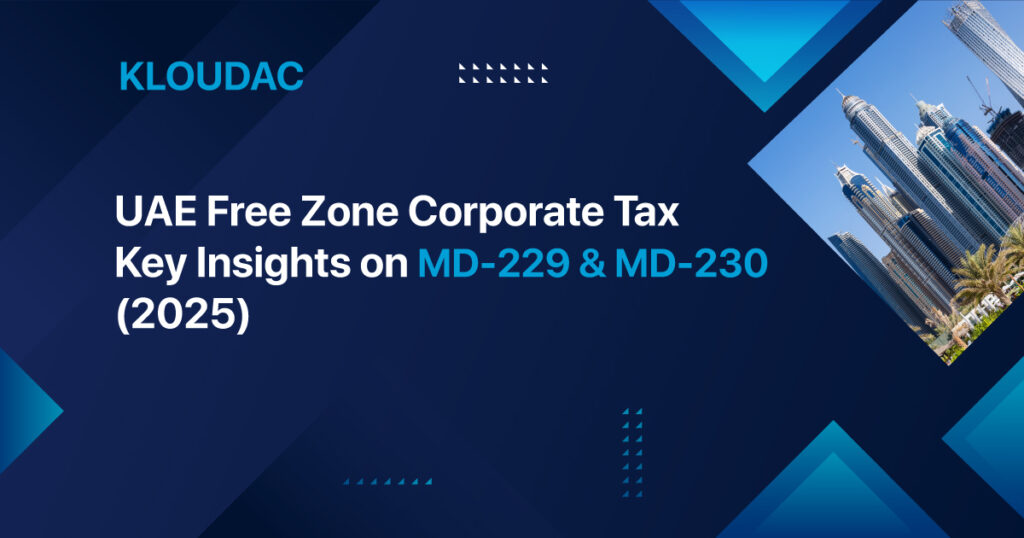The UAE has introduced new updates to Free Zone corporate tax rules through Ministerial Decision No. 229 (MD-229) and Ministerial Decision No. 230 (MD-230) in 2025. These changes are important for every business operating in a Free Zone. They redefine what counts as qualifying income, set stricter rules for commodity pricing, and tighten compliance requirements.
Free Zone businesses face a clear choice: adapt promptly or risk forfeiting the 0% corporate tax benefit. In addition, failure to comply may result in retroactive tax bills, unforeseen penalties, or multi-year disqualification.
1. What These Decisions Cover
Ministerial Decision No. 229 (MD-229) – Qualifying Free Zone Persons(QFZP)
MD-229 revises the rules for entities that qualify for 0% corporate tax in the UAE Free Zones.
Key updates include:
- Expanded Qualifying Activities
Commodity Trading encompasses industrial chemicals, by-products, and carbon credits. At the same time, Treasury & Financing recognises intra-group financing, treasury operations, and holding company functions. Furthermore, holding companies can qualify if they comply with the required documentation and activity standards. - Replaces MD-265 (2023)
As a result, the new rules provide broader eligibility while also introducing stronger safeguards to prevent misuse. - Compliance & Documentation
Maintaining accurate records is essential; otherwise, missing or insufficient evidence could lead to the loss of the 0% benefit.
Ministerial Decision No. 230 (MD-230) – Commodity Pricing Rules
MD-230 focuses on transparency and fair pricing for commodities traded in Free Zones.
Key updates include:
- Recognised Price Sources
Additionally, it provides a list of acceptable agencies and exchanges for verifying market pricing. - Transfer Pricing Alignment
Matches the UAE Free Zone rules with OECD/BEPS standards to stop artificial price adjustments. - Compliance Requirements
Businesses must link every commodity to an approved price source. In addition, transaction-level documentation is compulsory.
Non-compliance means income can be treated as non-qualifying and taxed at 9%.
2. Why Compliance is Critical
Ignoring these new rules is costly. Here’s what Free Zone businesses risk:
- Loss of 0% Exemption – Profits taxed at 9% immediately.
- Retroactive Bills – Past income may be taxed, plus interest.
- Multi-Year Disqualification – One mistake can mean losing benefits for up to 4 years.
- Audits & Penalties – Weak records attract fines and legal costs.
- Pricing Scrutiny – Trades without approved sources risk reclassification.
- Loss of Investor Trust – Tax disputes damage reputation and financing opportunities.
3. Practical Steps for Free Zone Businesses
To stay compliant and protect the 0% tax rate, businesses should:
- Map Activities – Compare operations with the new qualifying list.
- Check Commodity Pricing – Match every trade with approved price sources.
- Review Treasury & Holdings – Ensure intra-group financing and holding activities qualify.
- Strengthen Records – Keep clear evidence for transfer pricing and filings.
- Identify Non-Qualifying Income – Track mainland and unrelated-party income.
- Prepare for Digital Reporting – Upgrade accounting systems for compliance-ready reports.
4. Why This Matters for Your Business
Free Zones remain attractive because they offer major advantages, especially the 0% corporate tax rate. However, these benefits are not automatic, and businesses must comply with MD-229 and MD-230 to keep them.
If companies fail to comply, the risks are serious. For example, they could face retroactive tax bills, unexpected audits, or even multi-year disqualification from Free Zone benefits, the profits may fall, and investor trust can weaken.
Timely compliance not only secures the 0% exemption but also enhances tax efficiency. Moreover, it strengthens credibility and, in turn, supports long-term stability by reducing regulatory risks.
How KLOUDAC Can Help
KLOUDAC supports Free Zone businesses in:
- Reviewing qualifying activities and income
- Ensuring commodity pricing compliance
- Preparing transfer pricing documents and filings
📞 Contact KLOUDAC at +971 50 43 53 515 to secure your Free Zone tax benefits.
